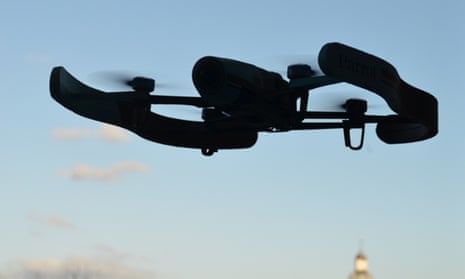A database of civilian drones being flown in the UK should be created to enforce their safe operation, a House of Lords report has recommended.
The database would log any civilian drone and their pilots and allow police greater powers to enforce flight rules, capturing rogue drones and being able to identify law breakers.
The report supported the European Commission’s proposals for legislation governing drone use across the EU, but urged for flexibility at a national scale to support a nascent industry that could provide Europe with 150,000 more jobs by 2050.
Committee chairman Baroness O’Cathain said: “We need to find ways to manage and keep track of drone traffic… drone flights must be traceable, effectively through an online database, which the general public could access via an app. We need to use technology creatively, not just to manage the skies, but to help police them as well.”
The report authors said “stifling the industry through over-regulation can be avoided if safety rules are proportionate to risk” while noting that misuse of drones by commercial or personal pilots could undermine public acceptance of the technology.
“The growth in civilian drone use has been astonishing. But public understanding of how to use drones safely may not keep pace with people’s appetite to fly them,” said O’Cathain.
Sophisticated air traffic control system needed
The report welcomes the EC’s plan to add drones, such as those weighing less than 20kg, to existing aviation research programmes seeking an air traffic control system capable of managing drones, as well as traditional aircraft.
The committee urged the EC to liaise with the US National Aeronautics and Space Agency, which is already working on something similar, and that a system capable of logging flight plans and drone identification numbers should be developed.
The lords cautioned that drone pilot liability insurance determined by the weight of the aircraft is not adequate, while the increased use of drones by journalists and authorities should be part of public debate on their acceptable use.
“Drones are a dream come true for voyeurs and industrial spies, and though they have the potential to transform the way we do business, they can also erode privacy and cause harm,” said Janine Regan, a data protection lawyer with Charles Russell Speechlys. “Like private security cameras, drones will be subject to data-protection constraints if they film public spaces, like roads or footpaths. Even the recipients of Christmas-present drones should be prepared to provide copies of the footage if requested by the individuals captured, or face legal sanctions.”
Current UK legislation by the Civil Aviation Authority dictates that drones cannot be flown within 50m of a building or a person and within 150m of a built-up area. In addition, the maximum flight height is 400 feet, and the drone has to remain in line of sight and within 500m of the pilot.
For commercial purposes, pilots must complete a training course and apply for a permit to fly the drone from the CAA.
The majority of consumers buying drones, which can be bought for as little as £40, are not aware of the rules governing their use. The lords and the CAA urge greater efforts from drone manufacturers to make consumers aware of the restrictions.

Comments (…)
Sign in or create your Guardian account to join the discussion